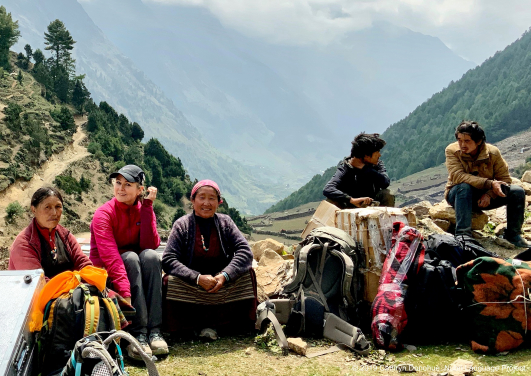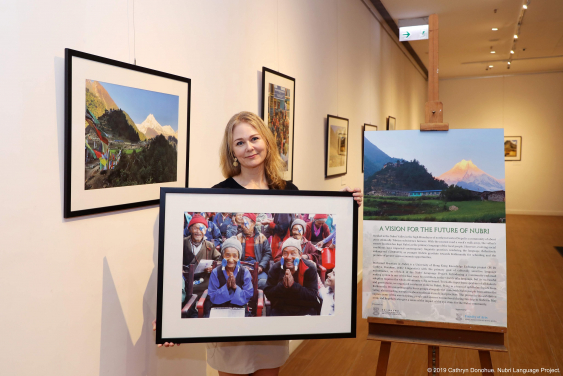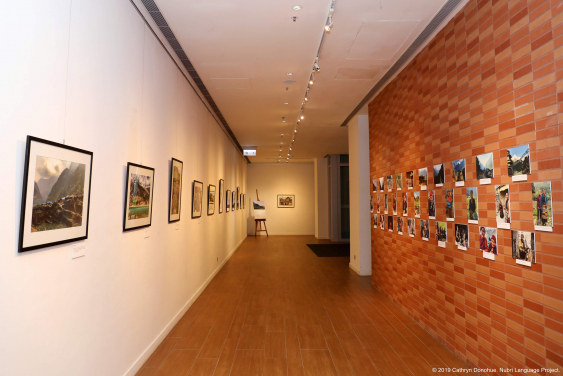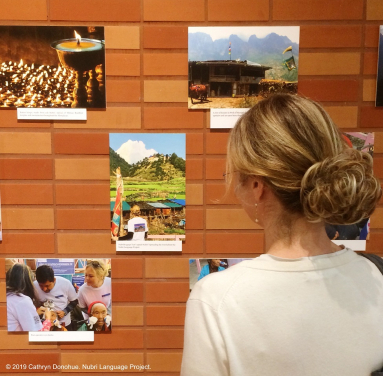Media
HKU Linguist’s Project on Endangered Language Helps to Bring Sight to Remote Village in Nepal
01 Oct 2019
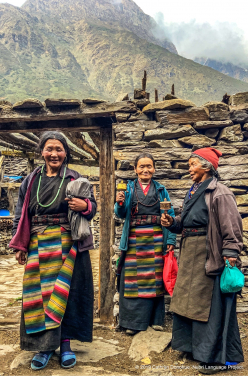
Three women standing in front of a typical home in the main path that runs through Sama village (3550m). They are wearing the typical Tibetan-style Nubri dress that most women over about 30 wear. They are on their way to the eye screening clinic.
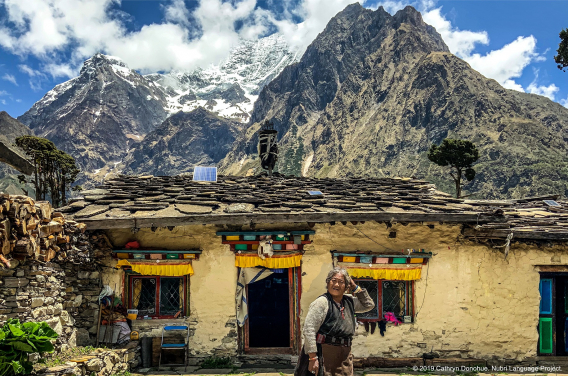
This home is attached to a small monastery in Sama, so it is more carefully constructed and more colourful. Houses are constructed from tightly piled stones but this home has been insulated by a coating of yak dung and paint. The monk’s wife stands in front.

Bihi village is at the east end of Nubri Valley. At only 2000m, it has a temperate climate, allowing a rich selection of crops to grow. However, because of the steep slopes surrounding the village, there is little arable land.
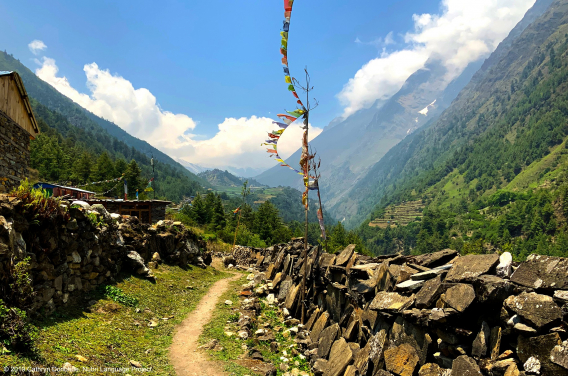
On the trek heading up Nubri Valley, just passing Syo, Ripum monastery perched atop the hill in Lho comes into view. The mani walls seen here on the right line many of the paths through the valley.
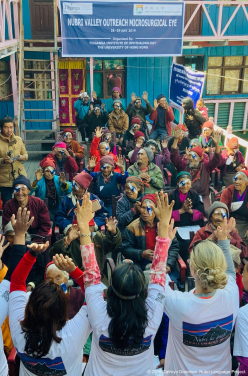
More than fifty people from across the Nubri valley underwent cataract surgery. All rejoiced at the successful outcomes, with cheers, tears, and even some dancing.
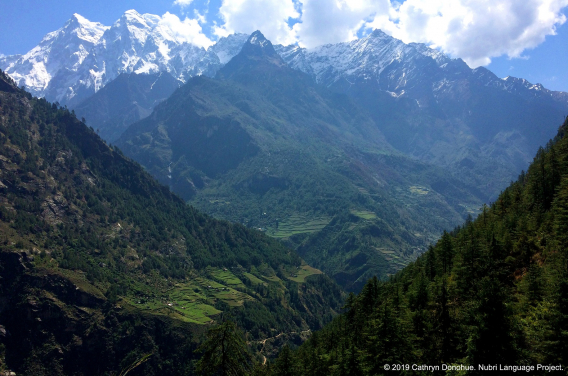
Many villages in lower Nubri are built on ancient landslips. These precarious looking slopes overlook the Budhi Gandaki river that starts in Tibet and runs through the valley to the Gorkha hills and then joins the Narayan River, and ultimately joins the Ganges. On the eastern edge of Nubri Valley looms Syarang Himal, the peak of which, Chamar, is 7165m, seen here from Prok village.
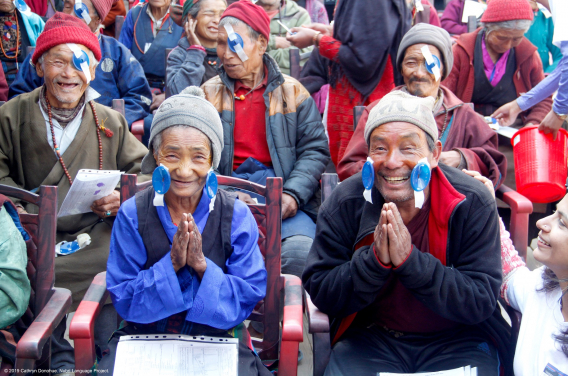
Two of the villagers who had bilateral cataracts removed are seeing for the first time after having been blind for several years.

Many little piles of rocks, or chörten, can be seen by the shores of Birendra lake. Constructed by visitors to honour their loved ones. Their shape resembles that of the stupas, so prominent in Buddhist architecture.
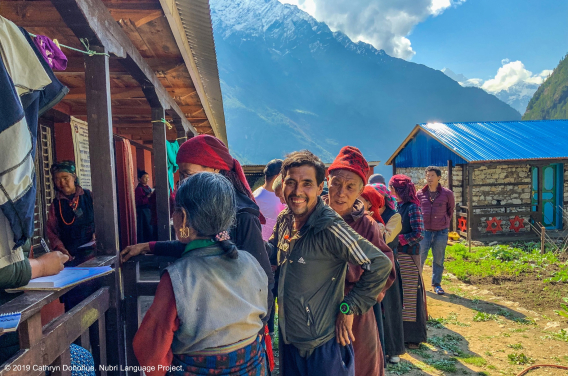
Screening clinics were held throughout the valley from Bihi to Sama, a good 4 days’ walk apart. People came from even further afield to attend the clinics. One woman, blind for about six years, could not walk the rough trails that are the only way around the valley. Her nephew carried her for more than five days to help her get to the clinic. When they left, her sight restored, they were both walking.
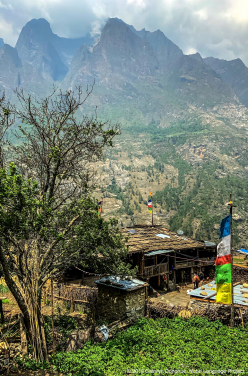
A row of typical houses, built as a single room (cooking, eating, sleeping) with a barn underneath. There is no running water in the homes, or electricity. Wires that are the start of the necessary infrastructure can be seen, but construction was halted after the 2015 Nepal earthquakes, the first and largest of which was centered to the immediate south, in Gorkha, and devastated much of the valley.
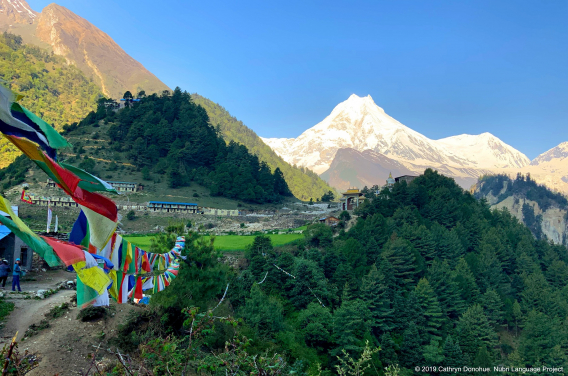
Mt Manaslu, eighth tallest mountain in the world at 8163m, presides over Nubri Valley. Viewed here from Lho village we also see a tree covered hill on the left that is home to Ripum monastery. Hidden from view on the right are the Nadi Chuli (7871m) and Himal Chuli (7893m) that are also part of the Mansiri Himal, so ever present in the scenery of Nubri Valley that has ten peaks over 6500m.
Dr. Cathryn Donohue from the Department of Linguistics in the Faculty of Arts at the University of Hong Kong (HKU) has been working on a Tibeto-Burman language,Nubri. Her efforts to preserve this endangered language have resulted in nearly 500 villagers in the remote Nubri Valley in Nepal receiving eye treatment. More than 50 villagers even regained sight through cataract surgery.
Situated near the border with Tibet in northern central Nepal, Nubri Valley is located about a week’s walk from the nearest road and is about 5 days’ walk from one end to the other. The ~2000 ethnically Tibetan people living in the valley speak Nubri, a Tibeto-Burman language. It has been described as ‘vulnerable’ or ‘definitely endangered’ by UNESCO, meaning that the future of the language is uncertain. Dr. Donohue has been working on the documentation of Nubri with the local community for the past few years and hopes to contribute to the preservation of this language.
Dr. Donohue argues that the Nubri language is at a critical juncture. She said: “Evolving social practices are resulting in increased language endangerment. This is in large part due to a significant portion of the younger generations moving out of the valley for schooling where Nepali is used in the classroom. This has resulted in a sharp decrease in the use of the language among the younger Nubris, threatening the language’s survival for future generations.”
In an attempt to try to secure the future of the language, Dr. Donohue investigated possible maintenance efforts. She thought that introducing a writing system, allowing Nubri to be written and thus used in more domains, is one of the best ways to preserve the language. Doing this successfully requires the involvement of the entire community, a challenge in the Nubri context where it is difficult to motivate time from subsistence farming to gather from across the valley and discuss orthographic proposals.
Dr. Donohue considered another dire need in the community --- healthcare, and eyecare in particular, so necessary for subsistence farmers. She facilitated a gathering of the Nubri people by organizing eye clinics. Cooperating with Kathmandu’s prestigious Tilganga Institute of Ophthalmology, highly experienced with remote clinics of this kind, Dr. Donohue was able to offer eye treatments for the villagers.
To carry out the eye clinics, doctors were flown into the valley by helicopter. They held six screening clinics throughout the valley which 499 villagers attended, roughly one-quarter of the Nubri population. Doctors treated various eye issues for the villagers and diagnosed 64 cases of cataracts that needed surgery. Another surgical clinic was then set up in a central location that precipitated a gathering of villagers from across the valley. Among those who underwent surgery, there was a 78-year-old woman who had been blind for six years and whose nephew carried her on his back for more than five days to have her sight finally restored.
“The eye clinic project was the first of its kind in Nubri Valley, enabling patients who would not be able to travel to Kathmandu due to financial or physical constraints to receive appropriate treatment. In addition to restoring vision for many in this community, the project also created an opportunity for the community gathering to discuss orthographic options, and to record some of Nubri’s traditional medicinal practices. It also has a longer-term impact by contributing to the documentation of Nubri language and culture, and hopefully to the preservation of the language through the introduction of a community-endorsed writing system”, said Dr. Donohue.
Further details about this and other linguistic aspects of the project are available from the following website: https://www.linguistics.hku.hk/nubri/.
Dr. Cathryn Donohue is an Assistant Professor in the Department of Linguistics, Faculty of Arts at the University of Hong Kong. Her research interests center on morphosyntax, with a particular focus on Sino-Tibetan languages. She has carried out fieldwork on a number of languages, including other Himalayan languages and Hong Kong’s minority dialects.
Video and photos can be downloaded here
For media enquiries, please contact Ms. Agatha Fung, Development and Communications Team, Faculty of Arts, Tel: (852) 3917 2381 / email: [email protected].


